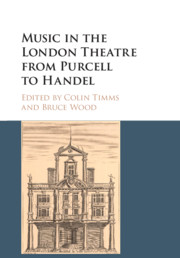Book contents
- Frontmatter
- Contents
- List of Figures
- List of Music Examples
- Notes on Contributors
- Preface
- Introduction
- I FROM PURCELL TO HANDEL
- II HANDEL AND ITALIAN OPERA
- III HANDEL AND ENGLISH WORKS IN THE THEATRE
- 10 Seventeenth-Century Literary Classics as Eighteenth-Century Libretto Sources: Congreve, Dryden and Milton in the 1730s and 1740s
- 11 ‘In this Ballance seek a Character’: The Role of ‘Il Moderato’ in L'Allegro, il Penseroso ed il Moderato
- 12 ‘Straight mine eye hath caught new pleasures’: Glancing and Gazing Spectatorship in Handel's L'Allegro, il Penseroso ed il Moderato
- 13 Accompanied Recitative and Characterisation in Handel's Oratorios
- 14 Handel, Charles Jennens and the Advent of Scriptural Oratorio
- Bibliography
- Index
11 - ‘In this Ballance seek a Character’: The Role of ‘Il Moderato’ in L'Allegro, il Penseroso ed il Moderato
from III - HANDEL AND ENGLISH WORKS IN THE THEATRE
Published online by Cambridge University Press: 10 June 2017
- Frontmatter
- Contents
- List of Figures
- List of Music Examples
- Notes on Contributors
- Preface
- Introduction
- I FROM PURCELL TO HANDEL
- II HANDEL AND ITALIAN OPERA
- III HANDEL AND ENGLISH WORKS IN THE THEATRE
- 10 Seventeenth-Century Literary Classics as Eighteenth-Century Libretto Sources: Congreve, Dryden and Milton in the 1730s and 1740s
- 11 ‘In this Ballance seek a Character’: The Role of ‘Il Moderato’ in L'Allegro, il Penseroso ed il Moderato
- 12 ‘Straight mine eye hath caught new pleasures’: Glancing and Gazing Spectatorship in Handel's L'Allegro, il Penseroso ed il Moderato
- 13 Accompanied Recitative and Characterisation in Handel's Oratorios
- 14 Handel, Charles Jennens and the Advent of Scriptural Oratorio
- Bibliography
- Index
Summary
Charles Jennens's Il Moderato (1740) is the longest English text written ab initio for Handel to set, yet there has been little critical examination of it. That is unsurprising. Modern taste does not warm to its theme or its diction. This chapter seeks to orientate the words of Il Moderato in the taste of Handel's time. It forms one of an intermittent series of attempts to fathom Handel's L'Allegro, il Penseroso ed il Moderato (1740–41), that apparently limpid, yet endlessly referential, composition. It will suggest why, when Handel wrote to Jennens from Dublin, ‘I assure you that the Words of the Moderato are vastly admired’, which is possibly the politest sentence that Handel ever wrote, he may have been quite truthful, rather than polite in the sense of insincerely tactful.
Diction
A contemporary reviewer of L'Allegro, il Penseroso ed il Moderato, whose essay includes high praise for Milton's twin poems L'Allegro and Il Penseroso, thought that the words of Il Moderato could well stand comparison with them:
Never was there in any Language so beautiful a Collection of Images suited to each of those Tempers, as in the two original Poems … had they been printed entire, and annex'd to the Drama, in a small Character [font], it would have been an agreeable Compliment paid to the Audience, had heighten'd the Relish of the Musick, and been no Injustice done to the Fitter of them for the Theatre; whose dramatic Moderato (or Mean between them) can very well bear being compared together.
The reviewer wishes that the wordbook had included Milton's original poems, so as to ‘heighten the relish’ of listeners by enabling them to compare Milton with what had been made of him by librettist and composer. The wish contains an assumption that some at least of Handel's audience really did pay attention to his librettists’ words in relation to his settings of them, and suggests that Handel was wise to respond to demands for music united with good English texts. It is in this context of attentive comparison that the reviewer finds that Jennens's words ‘can very well bear being compared’ with Milton's.
- Type
- Chapter
- Information
- Music in the London Theatre from Purcell to Handel , pp. 175 - 189Publisher: Cambridge University PressPrint publication year: 2017
- 1
- Cited by



